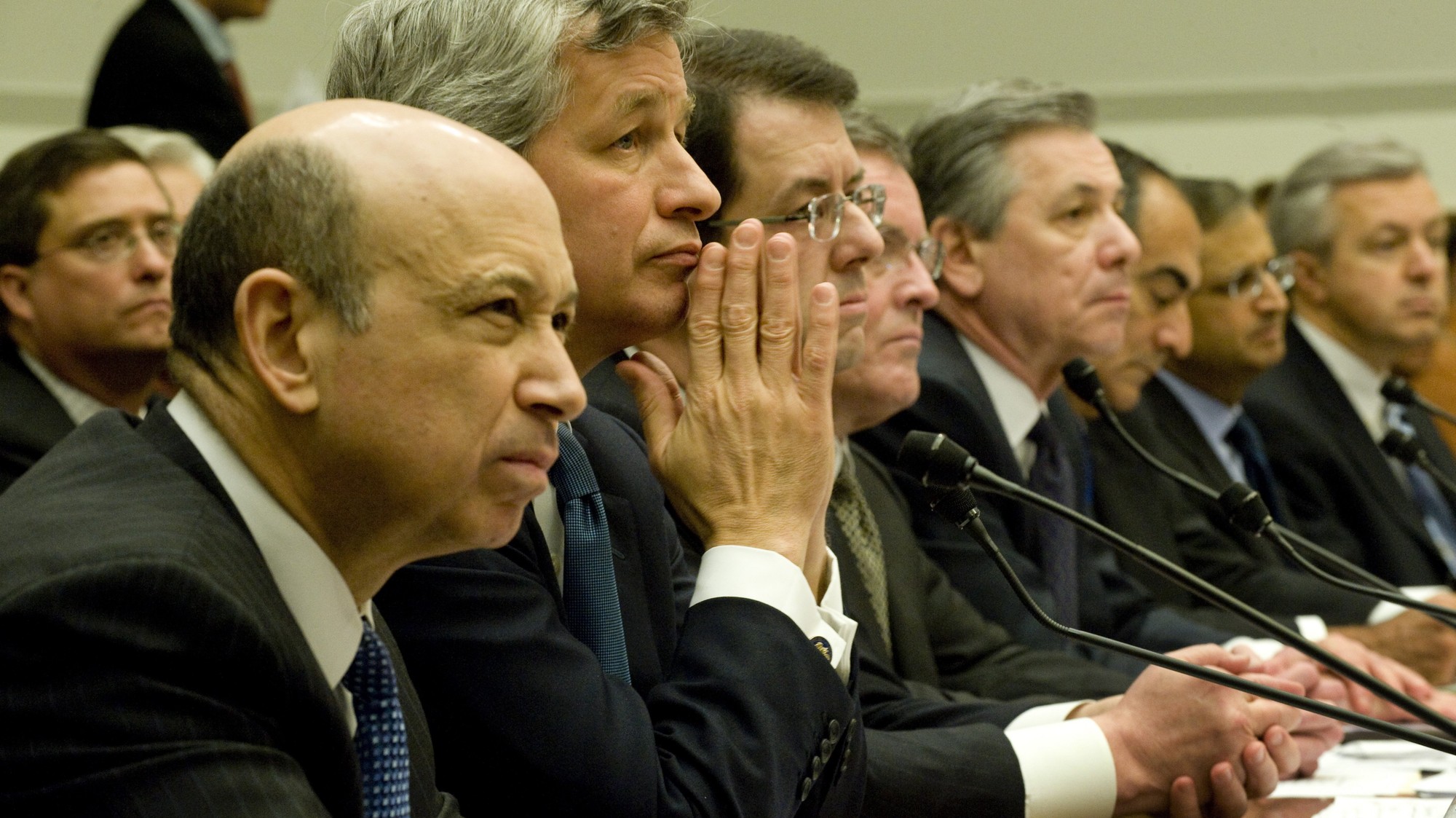The Bailouts for the Rich Are Why America Is So Screwed Right Now - VICE
Did they prevent a full-scale collapse? Yes. Was it necessary to do it the way we did? Not at all.

These guys got off pretty easy. (Photo by Scott J. Ferrell/Congressional Quarterly/Getty Images)
In 1948, the architect of the post-war American suburb, William Levitt, explained the point of the housing finance system. "No man who owns his own house and lot can be a Communist," he said. "He has too much to do."
It’s worth reflecting on this quote on the ten-year anniversary of the financial crisis, because it speaks to how the architects of the bailouts shaped our culture. Tim Geithner, Ben Bernanke, and Hank Paulson, the three key men in charge, basically argue that the bailouts they executed between 2007 and 2009 were unfair, but necessary to preserve stability. It’s time to ask, though: just what stability did they preserve?

These three men paint the financial crisis largely as a technical one. But let’s not get lost in the fancy terms they use, like “normalization of credit flows," in discussing what happened and why. The excessively wonky tone is intentional—it's intended to hide the politics of what happened. So let’s look at what the bailouts actually were, in normal human language.
The official response to the financial crisis ended a 75-year-old American policy of pursuing broad homeownership as a social goal. Since at least Franklin Delano Roosevelt, American leaders had deliberately organized the financial system to put more people in their own homes. In 2011, the Obama administration changed this policy, pushing renting over owning. The CEO of Bank of America, Brian Moynihan, echoed this view shortly thereafter. There are many reasons for the change, and not all of them were bad. But what’s important to understand is that the financial crisis was a full-scale assault on the longstanding social contract linking Americans with the financial system through their house.
The way Geithner orchestrated this was through a two-tiered series of policy choices. During the crisis, everyone needed money from the government, but Geithner offered money to the big guy, and not the little guy. First, he found mechanisms, all of them very technical—and well-reported in Adam Tooze’s new book Crashed—to throw unlimited amounts of credit at institutions controlled by financial executives in the United States and Europe. (Eric Holder, meanwhile, also de facto granted legal amnesty to executives for possible securities fraud associated with the crisis.) Second, Geithner chose to deny money and credit to the middle class in the midst of a foreclosure crisis. The Obama administration supported this by neutering laws against illegal foreclosures.
The response to the financial crisis was about reorganizing property rights. If you were close to power, you enjoyed unlimited rights and no responsibilities, and if you were far from power, you got screwed. This shaped the world into what it is today. As Levitt pointed out, when people have no stake in the system, they get radical.
Did this prevent a full-scale collapse? Yes. Was it necessary to do it the way we did? Not at all.
Geithner, Bernanke, and Paulson like to pretend that bank bailouts are inherently unpopular—that they were wise stewards resisting toxic (populist) political headwinds. But it’s not that simple. Unfair bank bailouts are unpopular, but reasonable ones are not. For an alternative, look at how a previous generation of Democrats handled a similar, though much more serious, crisis.
In 1933, when FDR took power, global banking was essentially non-functional. Bankers had committed widespread fraud on top of a rickety and poorly structured financial system. Herbert Hoover, who organized an initial bailout by establishing what was known as the Reconstruction Finance Corporation, was widely mocked for secretly sending money to Republican bankers rather than ordinary people. The new administration realized that trust in the system was essential.
One of the first things Roosevelt did, even before he took office, was to embarrass powerful financiers. He did this by encouraging the Senate Banking Committee to continue its probe, under investigator Ferdinand Pecora, of the most powerful institutions on Wall Street, which were National City (now Citibank) and JP Morgan. Pecora exposed these institutions as nests of corruption. The Senate Banking Committee made public Morgan’s "preferred list," which was the group of powerful and famous people who essentially got bribes from Morgan. It included the most important men in the country, like former Republican President Calvin Coolidge, a Supreme Court Justice, important CEOs and military leaders, and important Democrats, too.
Roosevelt also ordered his attorney general "vigorously to prosecute any violations of the law" that emerged from the investigations. New Dealers felt that "if the people become convinced that the big violators are to be punished it will be helpful in restoring confidence." The DOJ indicted National City’s Charles Mitchell for tax evasion. This was part of a series of aggressive attacks on the old order of corrupt political and economic elites. The administration pursued these cases, often losing the criminal complaints but continuing with civil charges. This bought the Democrats the trust of the public.
When Roosevelt engaged in his own broad series of bank bailouts, the people rewarded his party with overwhelming gains in the midterm elections of 1934 and a resounding re-election in 1936. Along with an assertive populist Congress, the new administration used the bailout money in the RFC to implement mass foreclosure-mitigation programs, create deposit insurance, and put millions of people to work. He sought to save not the bankers but the savings of the people themselves.
Democrats did more than save the economy—they also restructured it along democratic lines. They passed laws to break up banks, the emerging airline industry, and electric utilities. The administration engaged in an aggressive antitrust campaign against industrial monopolists. And Roosevelt restructured the Federal Reserve so that the central bank was not "independent" but set interest rates entirely subservient to the wishes of elected officials.
In 1938, Franklin Delano Roosevelt offered his view on what causes democracies to fail. "History proves that dictatorships do not grow out of strong and successful governments," he said, "but out of weak and helpless ones." Did the bailouts of ten years ago work? It’s a good question. I don’t see a strong and vibrant democracy in America right now. Do you?
Did they prevent a full-scale collapse? Yes. Was it necessary to do it the way we did? Not at all.

These guys got off pretty easy. (Photo by Scott J. Ferrell/Congressional Quarterly/Getty Images)
In 1948, the architect of the post-war American suburb, William Levitt, explained the point of the housing finance system. "No man who owns his own house and lot can be a Communist," he said. "He has too much to do."
It’s worth reflecting on this quote on the ten-year anniversary of the financial crisis, because it speaks to how the architects of the bailouts shaped our culture. Tim Geithner, Ben Bernanke, and Hank Paulson, the three key men in charge, basically argue that the bailouts they executed between 2007 and 2009 were unfair, but necessary to preserve stability. It’s time to ask, though: just what stability did they preserve?

These three men paint the financial crisis largely as a technical one. But let’s not get lost in the fancy terms they use, like “normalization of credit flows," in discussing what happened and why. The excessively wonky tone is intentional—it's intended to hide the politics of what happened. So let’s look at what the bailouts actually were, in normal human language.
The official response to the financial crisis ended a 75-year-old American policy of pursuing broad homeownership as a social goal. Since at least Franklin Delano Roosevelt, American leaders had deliberately organized the financial system to put more people in their own homes. In 2011, the Obama administration changed this policy, pushing renting over owning. The CEO of Bank of America, Brian Moynihan, echoed this view shortly thereafter. There are many reasons for the change, and not all of them were bad. But what’s important to understand is that the financial crisis was a full-scale assault on the longstanding social contract linking Americans with the financial system through their house.
The way Geithner orchestrated this was through a two-tiered series of policy choices. During the crisis, everyone needed money from the government, but Geithner offered money to the big guy, and not the little guy. First, he found mechanisms, all of them very technical—and well-reported in Adam Tooze’s new book Crashed—to throw unlimited amounts of credit at institutions controlled by financial executives in the United States and Europe. (Eric Holder, meanwhile, also de facto granted legal amnesty to executives for possible securities fraud associated with the crisis.) Second, Geithner chose to deny money and credit to the middle class in the midst of a foreclosure crisis. The Obama administration supported this by neutering laws against illegal foreclosures.
The response to the financial crisis was about reorganizing property rights. If you were close to power, you enjoyed unlimited rights and no responsibilities, and if you were far from power, you got screwed. This shaped the world into what it is today. As Levitt pointed out, when people have no stake in the system, they get radical.
Did this prevent a full-scale collapse? Yes. Was it necessary to do it the way we did? Not at all.
Geithner, Bernanke, and Paulson like to pretend that bank bailouts are inherently unpopular—that they were wise stewards resisting toxic (populist) political headwinds. But it’s not that simple. Unfair bank bailouts are unpopular, but reasonable ones are not. For an alternative, look at how a previous generation of Democrats handled a similar, though much more serious, crisis.
In 1933, when FDR took power, global banking was essentially non-functional. Bankers had committed widespread fraud on top of a rickety and poorly structured financial system. Herbert Hoover, who organized an initial bailout by establishing what was known as the Reconstruction Finance Corporation, was widely mocked for secretly sending money to Republican bankers rather than ordinary people. The new administration realized that trust in the system was essential.
One of the first things Roosevelt did, even before he took office, was to embarrass powerful financiers. He did this by encouraging the Senate Banking Committee to continue its probe, under investigator Ferdinand Pecora, of the most powerful institutions on Wall Street, which were National City (now Citibank) and JP Morgan. Pecora exposed these institutions as nests of corruption. The Senate Banking Committee made public Morgan’s "preferred list," which was the group of powerful and famous people who essentially got bribes from Morgan. It included the most important men in the country, like former Republican President Calvin Coolidge, a Supreme Court Justice, important CEOs and military leaders, and important Democrats, too.
Roosevelt also ordered his attorney general "vigorously to prosecute any violations of the law" that emerged from the investigations. New Dealers felt that "if the people become convinced that the big violators are to be punished it will be helpful in restoring confidence." The DOJ indicted National City’s Charles Mitchell for tax evasion. This was part of a series of aggressive attacks on the old order of corrupt political and economic elites. The administration pursued these cases, often losing the criminal complaints but continuing with civil charges. This bought the Democrats the trust of the public.
When Roosevelt engaged in his own broad series of bank bailouts, the people rewarded his party with overwhelming gains in the midterm elections of 1934 and a resounding re-election in 1936. Along with an assertive populist Congress, the new administration used the bailout money in the RFC to implement mass foreclosure-mitigation programs, create deposit insurance, and put millions of people to work. He sought to save not the bankers but the savings of the people themselves.
Democrats did more than save the economy—they also restructured it along democratic lines. They passed laws to break up banks, the emerging airline industry, and electric utilities. The administration engaged in an aggressive antitrust campaign against industrial monopolists. And Roosevelt restructured the Federal Reserve so that the central bank was not "independent" but set interest rates entirely subservient to the wishes of elected officials.
In 1938, Franklin Delano Roosevelt offered his view on what causes democracies to fail. "History proves that dictatorships do not grow out of strong and successful governments," he said, "but out of weak and helpless ones." Did the bailouts of ten years ago work? It’s a good question. I don’t see a strong and vibrant democracy in America right now. Do you?








